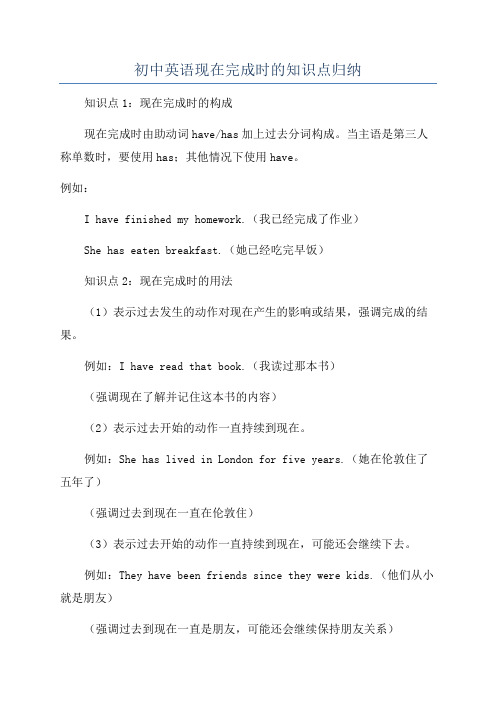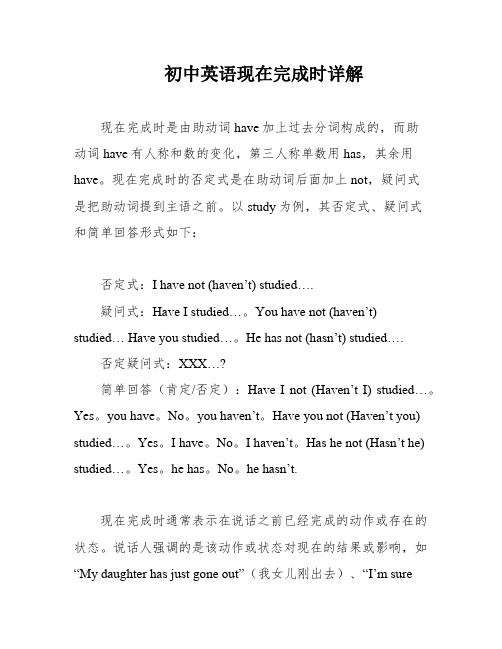初中英语现在完成时
初中英语语法现在完成时!

初中英语语法现在完成时!现在完成时是初二学生需要研究的语法内容,也是中考的难点和重点。
现在完成时的基本结构包括肯定句、否定句、一般疑问句和特殊疑问句。
肯定句的结构为主语+have/has+动词的过去分词,否定句的结构为主语+have/has+not+动词的过去分词,一般疑问句的结构为Have/Has+主语+动词的过去分词,特殊疑问句的结构为特殊疑问词+一般疑问句(have/has+主语+过去分词)。
现在完成时的用法有两种。
第一种用法是用来表示过去已经完成的动作对现在造成影响或后果。
也就是说,动作或状态发生在过去,但它的影响现在还存在,强调的是现在。
例如:“I have already posted the photo.”(我已经邮寄出了照片)。
与这种用法连用的时间状语是一些模糊的过去时间状语,如already(出现在肯定句中)、yet(出现在否定句/疑问句句尾)、just、before、recently、still、lately、never等。
第二种用法是用来表示动作或状态发生在过去某一时刻,持续到现在并且有可能会继续持续下去。
例如:“He has livedhere since 1978.”(自从1978年以来,他一直住在这儿)。
这种用法常与for(+时间段)和since(+时间点或过去时的句子)连用。
谓语动词必须是延续性动词。
有些瞬间动词可以变为延续动词,例如go out----be out、finish----be over、open----be open、die----be dead、buy---have、fall ill---be ill、come back----be back、catch a cold----have a cold。
现在完成时在考试中常见的考法包括单选、句型转换和词语运用。
考查学生在具体语境中灵活运用时态的能力。
在考试中,会让学生判断是否该使用现在完成时,或者是考查“瞬间动词不能与表示一段时间的状语连用”的知识点。
初中英语现在完成时的知识点归纳

初中英语现在完成时的知识点归纳知识点1:现在完成时的构成现在完成时由助动词have/has加上过去分词构成。
当主语是第三人称单数时,要使用has;其他情况下使用have。
例如:I have finished my homework.(我已经完成了作业)She has eaten breakfast.(她已经吃完早饭)知识点2:现在完成时的用法(1)表示过去发生的动作对现在产生的影响或结果,强调完成的结果。
例如:I have read that book.(我读过那本书)(强调现在了解并记住这本书的内容)(2)表示过去开始的动作一直持续到现在。
例如:She has lived in London for five years.(她在伦敦住了五年了)(强调过去到现在一直在伦敦住)(3)表示过去开始的动作一直持续到现在,可能还会继续下去。
例如:They have been friends since they were kids.(他们从小就是朋友)(强调过去到现在一直是朋友,可能还会继续保持朋友关系)知识点3:现在完成时的时间状语现在完成时常与以下时间状语连用:just(刚刚)、already(已经)、never(从来没有)、ever(曾经)、yet(还、仍然)、recently (最近)、since(自从)、for(持续了多久)等。
例如:I have just finished my homework.(我刚刚完成了作业)Have you ever been to America?(你去过美国吗?)They haven't seen each other since last year.(他们自从去年就没有见过面了)知识点4:现在完成时与一般过去时的区别现在完成时强调的是过去的动作对现在的影响或结果,而一般过去时只表示过去发生的动作或状态。
例如:He has lost his key.(他丢了钥匙,结果是他现在找不到)He lost his key.(他丢了钥匙)知识点5:现在完成时否定句和疑问句的构成现在完成时的否定句和疑问句构成是在助动词have/has之后加not 或否定词,疑问句将助动词have/has提到句首。
初中英语现在完成时

一般过去时常与具体的表示过去的时间状语连用;
现在完成时常与模糊的时间状语连用,或无时间状语。
一般过去时的时间状语:yesterday, last week, … ago, in June, in 1980, just now… ---具体的时间状语
现在完成时的时间状语:for, since, so far, ever, never, recently, yet, just, till/until, up to now, in the past few years…….---模糊的时间状语
现在完成时
The present perfect tense
现在完成时的结构:
have/:第一、二人称及复数 规则动词
has:第三人称单数 不规则动词
主语+have/has + 过去分词 + 宾语 + 状语
1. Sally took a photo of her friends while they ______ computer games. A. play B. are playing C. have played D. were playing 2. The last time I ______ to the cinema was two years ago. A. go B. have gone C. have been D. went 3.Mark ______ in China for ten years and now he teaches Chinese in Britain.( A. has worked B. worked C. had worked D. is working
He has come here for two years. F The old man has died for five months. F They have left only for three minutes. F 请把以上三个句子改正确 He has been here for two years. The old man has been dead for five months. They have been out only for three minutes.
初中英语现在完成时详解

初中英语现在完成时详解现在完成时是由助动词have加上过去分词构成的,而助动词have有人称和数的变化,第三人称单数用has,其余用have。
现在完成时的否定式是在助动词后面加上not,疑问式是把助动词提到主语之前。
以study为例,其否定式、疑问式和简单回答形式如下:否定式:I have not (haven’t) studied….疑问式:Have I studied…。
You have not (haven’t) studied… Have you studied…。
He has not (hasn’t) studied….否定疑问式:XXX…?简单回答(肯定/否定):Have I not (Haven’t I) studied…。
Yes。
you have。
No。
you haven’t。
Have you not (Haven’t you) studied…。
Yes。
I have。
No。
I haven’t。
Has he not (Hasn’t he) studied…。
Yes。
he has。
No。
he hasn’t.现在完成时通常表示在说话之前已经完成的动作或存在的状态。
说话人强调的是该动作或状态对现在的结果或影响,如“My daughter has just gone out”(我女儿刚出去)、“I’m surewe’ve met before”(我肯定我们以前见过面)和“She has arrived”(她到了)等。
此外,现在完成时还可以表示持续到现在的动作或状态,往往和包括现在在内的表示一段时间的状语连用,如recently、already、just、lately、for…、since…、yet等。
例如,“I haven’t heard from her these days”(这些日子我没有收到她的信)和“XXX”(最近我们没有见到你)等。
还有一些表示时间的短语也可以和现在完成时连用,如:①for+时段②since+过去一个时间点(译为:自从……以来)③since+时段+ago④since+从句(过去时)Mary has been ill for three days。
初中英语语法现在完成时

初中英语语法现在完成时语法是英语考试中的重中之重,所占分值也多。
提高英语能力的方法是多读多练多积累。
小编在这里整理了初中英语语法现在完成时供大家阅读,希望能帮助到您。
初中英语语法现在完成时1、现在完成时的构成:现在完成时是由“助动词have/has+动词过去分词”构成的。
①助动词have/has可以与主语缩写为’ve/’s。
e.g. I have →I’ve We have → We’ve He has → He’s It has → It’s②规则变化的过去分词与动词过去式一样。
③不规则变化的动词过去分词见表。
2、现在完成时的基本句型。
①陈述句肯定形式。
e.g. I have had lunch. 我已经吃过午饭了。
He has gone to Beijing. 他去北京了。
②陈述句否定形式。
(在助动词have/has后+not,可缩写为haven’t/hasn’t)e.g. I haven’t had lunch. 我还未吃午饭。
He hasn’t gone to Beijing. 他还没有去北京。
③一般疑问句形式及其答语。
(将助动词have/has提前,答语一般用have, has回答)e.g. Have you had lunch? 你吃过午饭了没? Yes, I have. No, I haven’t.Has he gone to Beijing? 他去过北京了没有? Yes, he has. No, he hasn’t.否定回答还可以用:No, not yet. / No, never. / No, not even once等。
④特殊疑问句形式。
(疑问词+一般疑问句)e.g. Where has he gone? 他去了哪里?3、现在完成时的三个基本用法。
(1) 现在完成时的第一个基本用法表示过去发生或已完成的某一个动作对现在造成的影响或结果。
e.g. Have you had lunch? Yes, I have. I’ve just had it. 你吃过午饭没?有,吃过了,我刚刚吃的。
初中英语现在完成时(共25张PPT)

1.肯定句:
主语+have/has(助动词)+过去分词+(其他)。
5. Sally joined the League two years ago.
Sally _______________ the League for two years.
has been in
比较延续性动词与瞬间性动词
延续性动词:表示可以延续一段时间的动作或状态。如: be,drink,fly,eat,keep,lie,live,rain等。 瞬间性动词:表示不能延续的动作,即动作发生后立即结束。如:
6. He left here 2 years ago.
--- He has been away from here for 2 years.
7. The film began 30 minutes ago. --- The film has been on for 30 minutes.
3.The meeting began two minutes ago.
The meeting __h_a__s_b_e_e_n__o_n_____ for two minutes.
4.We borrowed two books last week.
We __h_a__v_e_k__e_p_t____ the two books for a week.
They have left. --他们已经离开了,也就是说现在他们人不在这里 I have had my lunch. --我已经吃过午饭了,也就是说我现在不饿
初中英语现在完成时态
现在完成时态构成 : 主语 + have/has + 过去分词 + 其他。
否定式 : 主语 + haven't/hasn't + 过去分词 + 其他。
一般疑问式 : Have /Has + 主语 + 过去分词 + 其他简略答语 : Yes, 主语 + have/has.(肯定No, 主语 + haven't/hasn't.(否定一、现在完成时态用法一:动作发生在过去,一直延续到现在,可能还会继续。
(如图●————————————现在该用法中常用词:for, since, how long. 例如:for 后跟时间段 , since 后跟过去时间点或者是过去时态的句子。
How long have you learned English?I have learned English for ten years.I have learned Englishsince ten years ago.注意:此用法中还要注意,因为要表示动作一直延续到现在,所以主句中的动词要选择表延续性的动词。
例如:He has been dead for ten years.(be dead是 die 的延续性词He has been away for two hours. (be away是 leave 的延续性词常见瞬间动词与延续动词的转换:come / go / arrive/ get to/reach -- be in s.p.leave – be away buy – have die – be dead borrow – keep join sth.– be in sth. come back – be backbegin to do sth – do sth ( begin to work – workbegin - be on become sth. – be sth.二、现在完成时用法二:表示过去某个动作发生过,对现在造成影响。
初中英语 现在完成时
初中英语语法现在完成时一、构成肯定句:have/has+主语+过去分词+其它(当主语是第三人称单数时,用has,其它的用have。
过去分词:规则过去分词与动词过去式相同,不规则动词要特殊记忆)否定句:have/has+主语+not+过去分词+其它疑问句:Have/Has+主语+过去分词+其它简答:Yes, 主语+have/has.No, 主语+haven’t/hasn’t二、现在完成时的用法(一)现在完成时的用法一1:表示过去发生或已经完成的某一动作对现在造成的影响或结果。
2.谈论到现在为止曾经经历或者没有经历的事情。
3.表达刚刚做完某事,已经做完某事,可与just ,already,yet连用。
此时,常与时间副词already(已经),yet(还、已经),just(刚刚、仅仅) ,ever(曾经),never(从不),before(以前)等连用。
这几个副词的用法如下:1.already意为“已经”,通常用于肯定句中,可放在助动词之后,过去分词之前,也可以放在句末。
实例:1)I've already read this book. 我已经读过这本书了。
(“读”这一动作发生在过去,对现在造成的影响是“知道书中的内容”。
)2)I've washed my clothes already.我已经洗了衣服。
(洗衣服的动作已完成,其结果是“衣服冼干净了”。
)注意:在表示吃惊或明知故问等感情色彩时,already也可用于(口语)疑问句中。
实例:3)Have you met him already ?你(真的)已经见过他了?2.yet用在疑问句中意为“已经”,用在否定句中意为“还”,常放在句末。
实例:1)—Has he found his watch yet ?他已经找到他的手表了吗?—No,not yet.不,还没有。
2)The woman hasn't found her dog yet .那位妇女还没有找到她的狗。
初中英语现在完成时经典总结
一、现在完成时的定义现在完成时既可表示过去发生的动作对现在所造成的结果或影响(此时通常连用的时间状语有already, yet, just, ever, before, in the past),也可表示动作从过去某时间开始,一直持续到现在,并且还有可能持续下去(此时通常连用的时间状语有this month / week / year, these days, recently / lately, in the past few + 时间段, since +时间点, for + 时间段)。
例如:①I have just finished my work. 我把工作做完。
②Have you ever been to Beijing? 你曾经去过北京吗?③I have lived for ten years. 我在这儿住了十年了。
④We have studied here since 2003. 我们自2003年来就在这儿读书了。
二、现在完成时的结构现在完成时由“have / has + 过去分词”构成。
即由助动词have(has)+动词的过去分词构成。
助动词说明该谓语是属于现在时范围。
它和主语的人称、数要保持一致。
过去分词是主要的谓语动词,说明了句子的意义。
(一)肯定式主语+助动词have/has +过去分词+其它说明:这里的have/has是助动词,没有什么具体意义。
当主语是第三人称单数时助动词用has,其余人称一律用have。
have的缩略式've。
规则动词过去分词的构成与过去式的构成方式一样,不规则动词可参看不规则动词表。
1)I've just copied all the new words .我刚抄写了所有的生词。
(表示不要再抄了)2)She has lost her books .她丢失了她的书。
(表示到目前为止还没有找到)(如果用过去时:She lost her books . 则强调书是过去丢的这一动作,而不知现在有没有找到)3)We've just cleaned the classroom .我们刚好打扫了教室。
初中英语现在完成时讲解全(共24张PPT)
I studied English ten years ago.
(come来到某地….
left the team
has been on C.
表示动作发生在过去,对现在造成的影响。
)
be over
went to bed
填空使用for和since
Tom ___for several hours.
表示动作发生在过去,对现在造成的影响。
• She has lived here ______1996.
• 2 标准词:so far/up to now (到目前为止) ;lately/recently(最近)
• Up to now/So far ,I haven’t been successful.
• Lately/Recently,I haven’t seen my teacher.
3. He bought the motorbike a month ago.
---He ____ ____ the motorbike for a month. 4. He arrived here three days ago.
--- He ____ ____ here since three days ago. 5. They turned off the light 2 hours ago.
(finish结束....)
be over
1.我买这本书三年了。Buy I have bought the book.
(1) I have had the book for 3 years. (2) I have had the book since 3 years ago.
了borrow He has borrow the book. (1)He has kept the book for 2 months . (2) He has kept the book since 2 months ago.
- 1、下载文档前请自行甄别文档内容的完整性,平台不提供额外的编辑、内容补充、找答案等附加服务。
- 2、"仅部分预览"的文档,不可在线预览部分如存在完整性等问题,可反馈申请退款(可完整预览的文档不适用该条件!)。
- 3、如文档侵犯您的权益,请联系客服反馈,我们会尽快为您处理(人工客服工作时间:9:00-18:30)。
. 15. She has been away from the city __ about ten years
16. It’s about ten years __ she left the city.
come/go
begin/start stop
Used for a continuous state
have/has had have/has kept have/has been in/at have/has been away
have/has been in/a member of have/has been dead have/has been married
瞬间性动词例如come,go,leave等,不和表示延续性的时间状语连用, 例如for two hours或者是since last month。如果我们想用它们来表达 延续性的状态,就要把他们转化成对应的延续性动词。
Verb
buy borrow arrive leave
join
die get married
1. He died 10 years ago.
延
--- He ____ ____ ____ for 10 years / since 10 years ago. 2. He borrowed the book 2 weeks ago.
续 性 动
--- He ____ ____ the book for 2 weeks.
They have left. --他们已经离开了,也就是说现在他们人不在这里 I have had my lunch. --我已经吃过午饭了,也就是说我现在不饿
也可表示持续到现在的动作或状态。 He has learned English since 2001. --从2001年开始学的,现在还在继续学着呢
years.
1.Mr. Black left China in 1990.
Mr. Black __h_a_s__b_e_e_n__a_w_a_y__f_r_o_m___China since 1990.
2.The hero died five years ago.
The hero __h_a__s_b_e_e_n__d_e_a_d____ for five years.
5. Sally joined the League two years ago.
Sally ___h_a_s__b_e_e_n__i_n__ the League for two years.
比较延续性动词与瞬间性动词
延续性动词:表示可以延续一段时间的动作或状态。如: be,drink,fly,eat,keep,lie,live,rain等。
性
--- He has kept the book for 2 weeks. 3. He bought the motorbike a month ago.
---He has had the motorbike for a month. 4. He arrived here three days ago.
间 性 动
5. They turned off the light 2 hours ago.
词
--- The light ____ ____ ____ for 2 hours.
之
6. He left here 2 years ago. --- He ____ ____ ____ from here for 2 years.
之
--- He has been away from here for 2 years.
间
7. The film began 30 minutes ago.
比较since和for
since 用来说明动作起始时间— “自从……” for用来说明动作延续时间长度— “长达……” I have lived here for more than twenty years. I have lived here since I was born. My aunt has worked in a company since 1949. I have not heard from my uncle for a long time.
瞬间性动词:表示不能延续的动作,即动作发生后立即结束。 如: begin,arrive,borrow,buy,break,close,come,fall,finish,go, leave,lend,mary,reach,receive,open,,start,stop等。 瞬间性 的动词是不能持续的,所以不能和表示一段时间的状语连用。
现在完成时
2017.11.24
冬天已经来了,
Winter has already come,
春天还会远吗 ?
will it still be far in spring?
Winter has already come.
现在完成时态
现在完成时的构成形式
助动词 have
has
过去 分词
done
助动词have/has可和前面的主 语缩略为’ve,’s.如 they’ve, we’ve,
间 的 转
7. The film began 30 minutes ago.
化
--- The film ____ ____ ____ for 30 minutes.
8. They opened the door an hour ago.
--- The door ____ ____ ____ for an hour.
Meaning
Example
已经
I have already done my homework.
还(未) I have not finished my homework yet.
从不,从没 I have never read this story.
曾经
Have you ever watched this film?
9. They closed the door an hour ago.
--- The door ____ ____ ____ for an hour.
10. He joined the army last year.
--- He ____ ____ a ____ for a year.
--- He ____ ____ ____ the army for a year.
he’s, it’s; you’ve
has not=hasn’t
have not=haven’t
过去分词的变化
1、一般动词,在词尾加 +ed work, plant,call 2.以字母e结尾的动词,词尾加+d live, change,
like, love, agree, save hate, move, arrive, skate, hope, use 3.以重读闭音节结尾,末尾只有一个辅音字母的
3.The meeting began two minutes ago.
The meeting __h_a_s__b_e_e_n__o_n_____ for two minutes.
4.We borrowed two books last week.
We _h__a_v_e_k__e_p_t_____ the two books for a week.
Simon has been a member of the Football Club since last year. The fish has been dead for two days. They have been married for more than twenty years. My cousin has been in Beijing for a month. The meeting has been on for half an hour. The conference has been over since last
have/has been in/at
have/has been on have/has been over
Example
He has had the watch for over two years. She has kept this book for two weeks. Kitty has been in Nanjing for a month. She has been away from home for ten years.
双写辅音字母+ed. 如:plan, stop,drop,fit(适 合), prefer(更喜欢), travel 4.以辅音字母+y,结尾,变y为i+ed try, study, carry, hurry, cry, worry,copy
1.肯定句:
主语+have/has(助动词)+过去分词+(其他)。
--- It ____ a year ____ he joined the army.
1. He died 10 years ago.
延
--- He has been dead for 10 years / since 10 years ago.
续
2. He borrowed the book 2 weeks ago.
二、用since和for填空
1.____two years 2.____two years ago 3.___last month 4.___ 1999 5.___yesterday 6.__4 o’clock 7__4 hours 8.___an hour ago 9.___we were children 10.__ lunch time 11.___ she left here 12. He has lived in Nanjing __ the year before last. 13. I’ve known him __ we were children.
